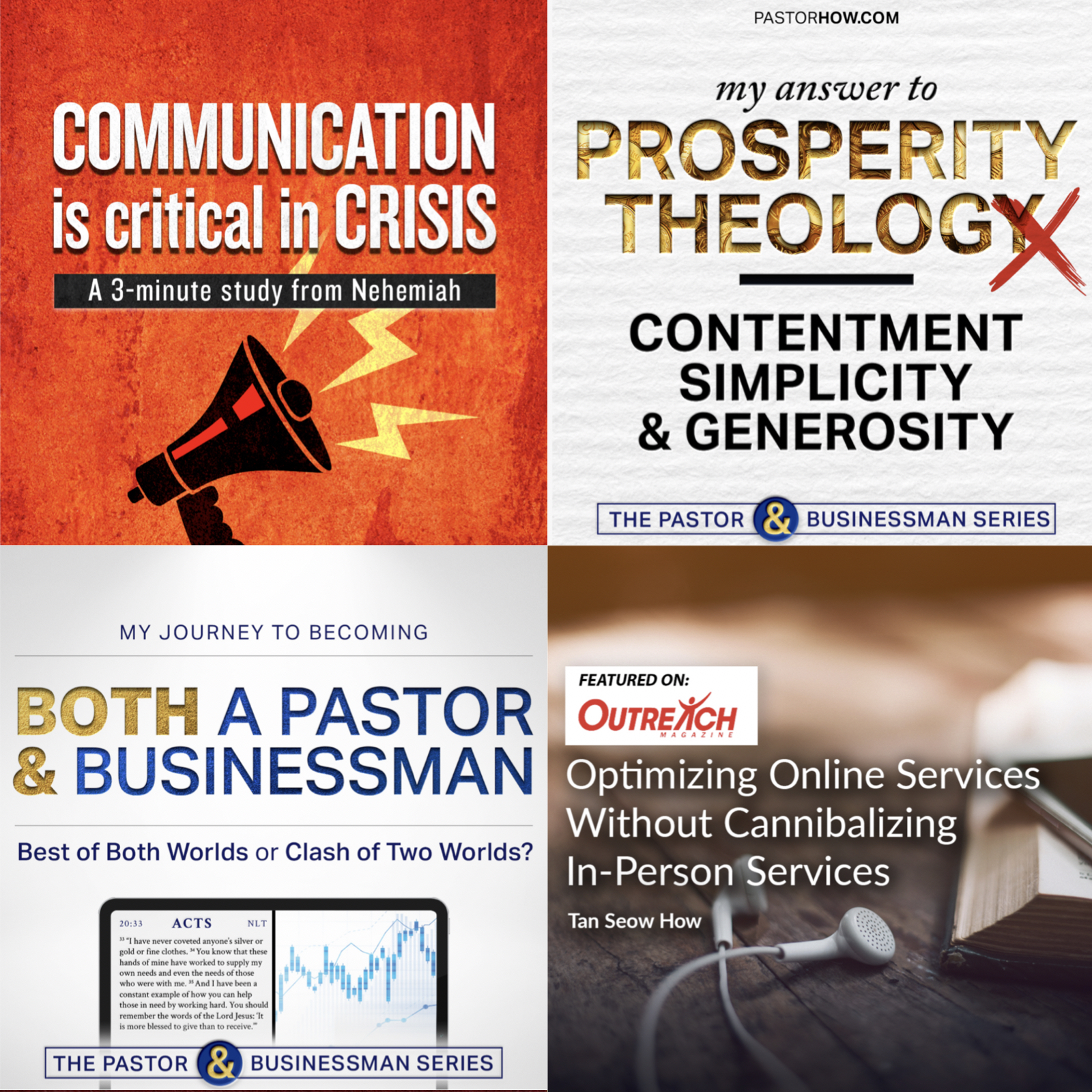
Receive leadership principles for building a Strong Church
We sat down with Pastor Tan Seow How (Pastor How), Senior Pastor of Heart of God Church (HOGC), to talk about his unique position as pastor and businessman and how he navigates the intricacies of being in both worlds. This interview follows an article that he posted on his blog: My Journey To Becoming BOTH A Pastor and Businessman.
On the contrary, you can find this archetype even in the Old Testament, with King David.
David was a king, which you could call a secular office. But he also performed the job of a priest. When he brings the Ark of the Covenant back to Jerusalem, David offers burnt offerings and peace offerings (2 Samuel 6:17–18)—duties usually done by priests.
Jesus, the Son of David, is also both King and Priest. As believers, we are called a chosen generation and royal priesthood (1 Peter 2:9). This, in turn, makes us both kings and priests (Revelation 1:6).
And you see other examples of this in the New Testament as well. Paul was both an apostle and a tentmaker. Priscilla and Aquila were business people and pastors. Luke was both a doctor and a missionary.
In the Bible, priests represent spiritual authority. They went to God on behalf of the people. God also spoke to the priest who would then communicate God’s vision to the people.
Kings represent earthly authority. They were the ones who governed the nation. They were responsible for providing the money and resources to accomplish God’s will.
You can think of it as—the priests had the vision. The kings supplied the provision.
In modern-day terms, priests are the church pastors, spiritual leaders, full-time staff, missionaries, those in the five-fold ministries. Kings would be the business people, those in the marketplace.
Being both a priest and king means one can have a dual calling. We need not be boxed in by a separation between laity and clergy. I am seeing this chasm being bridged. Marketplace Christians are giving more than half their time to church and spiritual work while pastors/full-time staff are venturing into the business realm.
That doesn’t mean everyone has to become a pastor. It does mean that serving God at a high capacity doesn’t have to be limited to the pastors or church staff. Those in business or in the marketplace can and should be encouraged to do more in ministry. On the flip side, it also means that pastors and church staff are not pigeon-holed to doing “just church work”.
In our times, when a businessman takes on a second role as a pastor, he is celebrated. But when a pastor becomes a businessman, it is viewed as compromise. Unfortunately, when a pastor takes on a second vocation as a businessman, he is viewed as a wolf in sheep’s clothing. But when a businessman embraces the ministry, he is viewed as a sheep in wolf’s clothing… enlightened yet worldly wise and resourceful.
Truth is—while it has always been easier and simpler to keep the secular and sacred separate to avoid negative perception, the reality is “laity” and “clergy” are an anachronism in this modern world. It is no longer just ‘either/or’ but ‘both/and’.
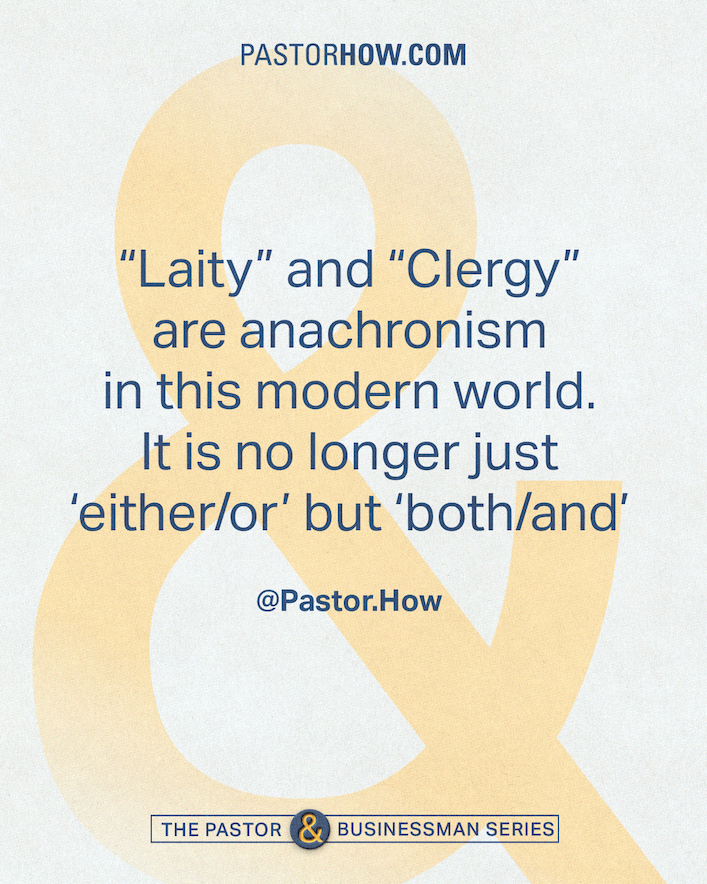
No, not at all. Firstly, as I mentioned in my article, my priorities are very clear. My first priority is the church. The business is my ancillary calling. I am first a Christian, first a pastor, then a businessman.
Practically, I probably spend about two to four hours a week on my business. Even in the early years of the business, maybe I spent a day at most. And this is possible because I have a trustworthy and competent team in the business.
So, instead of taking away from church, the reverse is true. The business benefits the church.
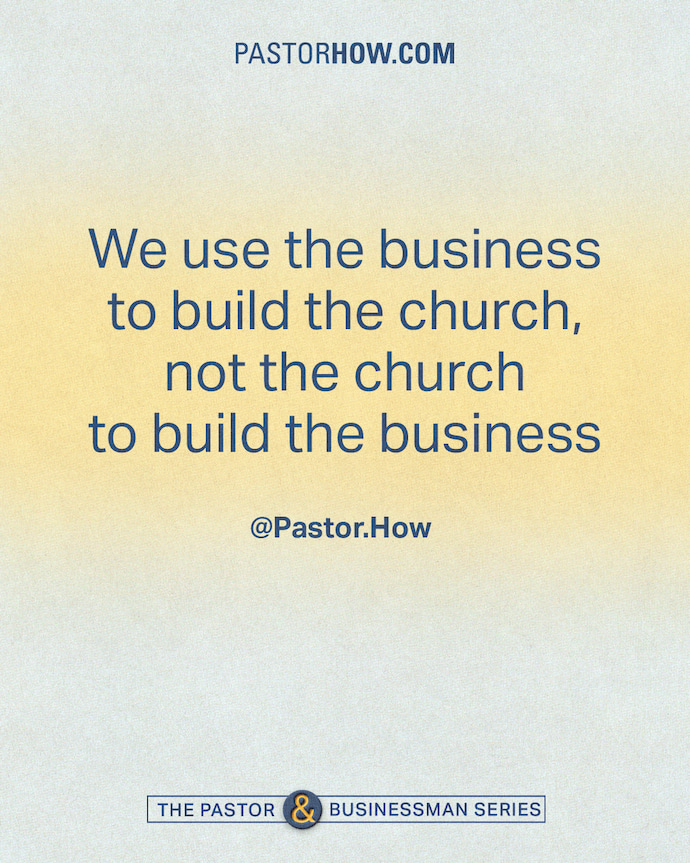
On a personal level, the business pays for all my missions and travel expenses. When I go overseas to preach, the church does not have to pay for my flight tickets, accommodation, etc. In fact when our business staff fly to Hong Kong, the business pays for all their travel expenses, but they can also use that opportunity to meet local pastors and visit churches while they are there. On a more macro scale, the business allows me to bless and build the church. I also paid for the renovation of my own office in church and the guest hospitality room.
Again, it all goes back to the heart and motivations. Bishop Dale Bronner says “Money makes a great servant but a terrible master.” Money in itself is not evil. The question is “Whom do you serve?”. Pastor Lia and I choose to serve God. Money is our servant. It is simply a tool to be used for building His kingdom. We see ourselves as blessed to be a blessing. In other words, we use the business to build the church, not the church to build the business. That may sound like a cliché, but to actually live it out is not.
The most obvious way is financially. I already mentioned how our business enabled Pastor Lia and I to give SG$1 million to the HOGC building fund. On top of that, over the last 4.5 years, we have also given over SG$400,000 worth of products from the business to bless pastors and leaders all over the world.
The church also benefits from the expertise and exposure we gain through business. These areas include systems, processes, professionalism, customer service best practices, even big data and using analytics and statistics to make better decisions.
We also gain contacts and connections that benefit the church. For example, because we are in the audio business, we had access to top sound engineers whom we then brought in as consultants to help us improve the acoustics of our church auditorium.
Beyond that, we also try to find ways to use the business to help the church save money. For example, when church needs to move large bulky items, we volunteer the company van and manpower to help at no charge.
When we were renovating our current worship venue, Imaginarium, my business also donated speakers for the lobby, corridors and toilets. In fact, if the church uses any items from brands that my business carries, they are all given for free. The church doesn’t have to pay anything.
We even went one step further to cover the visible branding so it would not be misconstrued as advertising—you know how perception can be… even things done out of good intentions can be misinterpreted.
Yes. As I mentioned, when it comes to church and business, I take great pains to keep things above board. Money only moves in one direction, from the business to church.
But even then, no matter how stringent my internal policies are, I have started to accept that I still cannot control external perception. There will always be people who are bent on finding fault. So I weigh the consequences and do as much as I can to bless the church.
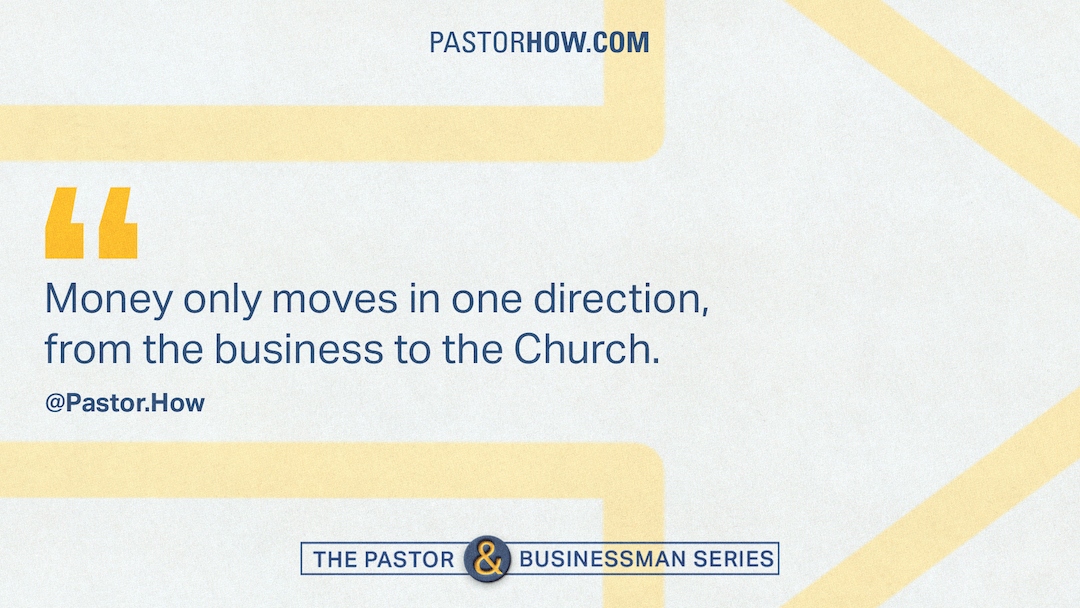
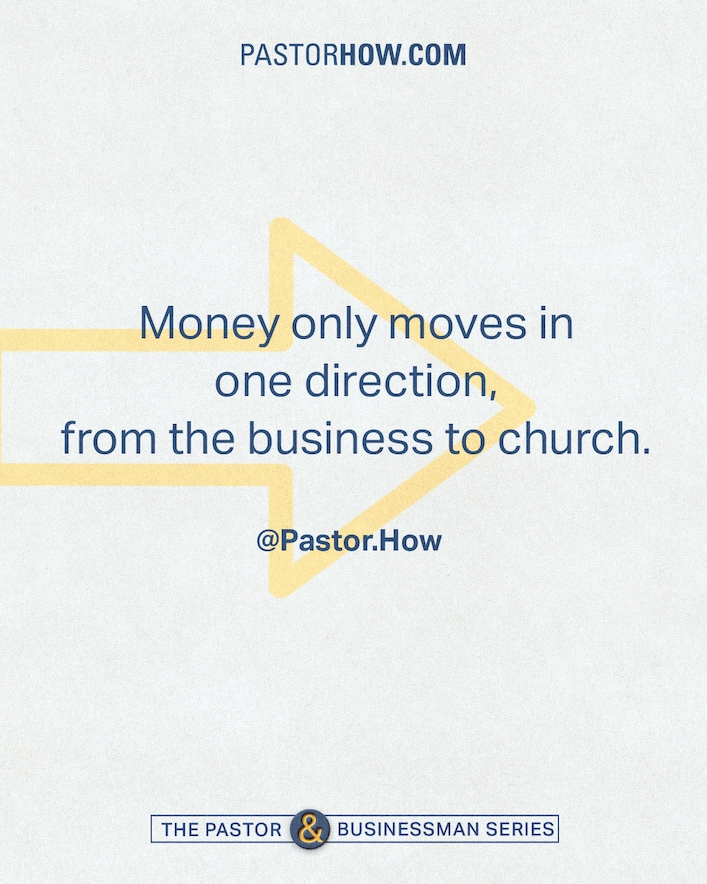
Take for example when we were renovating the Imaginarium. We had to purchase a sound system for the auditorium. My business carries a brand from a top commercial speaker manufacturer in the United States. I could have gotten the sound system at distributor cost. That would save the church tens of thousands of dollars. But because of perception, I chose not to. That frustrates me.
Even though I would not earn a single cent from the transaction—
Even if the Board of Directors had given their approval—
It would not stop naysayers from perpetuating misinformation especially in the virtual world. That in turn would fuel the negative sentiment about Christians and pastors. Worse, it could affect our church members’ family and friends’ perception about church and make it harder for our members to share Christ with them.
I didn’t think the negative fallout was worth it. So the church decided to buy another brand of speakers even though it came at a much higher cost.
I see business and entrepreneurship as a means to give the pastors and staff what I call Sustainable Idealism. As I mentioned in my article, God gave me a revelation from the verse in Acts 20:33-35. Like Paul, I want to be able to say that I have worked not just to supply my own needs but also the needs of those who were with me—my team.
Providing for the needs of my team does not mean that they have just enough to survive, but I want them to be able to live normally and have savings for a rainy day. I need to make the distinction, though—Sustainable Idealism is not about living in luxury, but about having the luxury of options. It is not about living the high life, but living out the High Call (maturity and Christ-likeness). I’m not against being rich. Neither am I for having a poverty mindset. I just do not want my team to have to fight on two fronts—I want them to be able to focus on doing the work of God without having to worry about their finances.
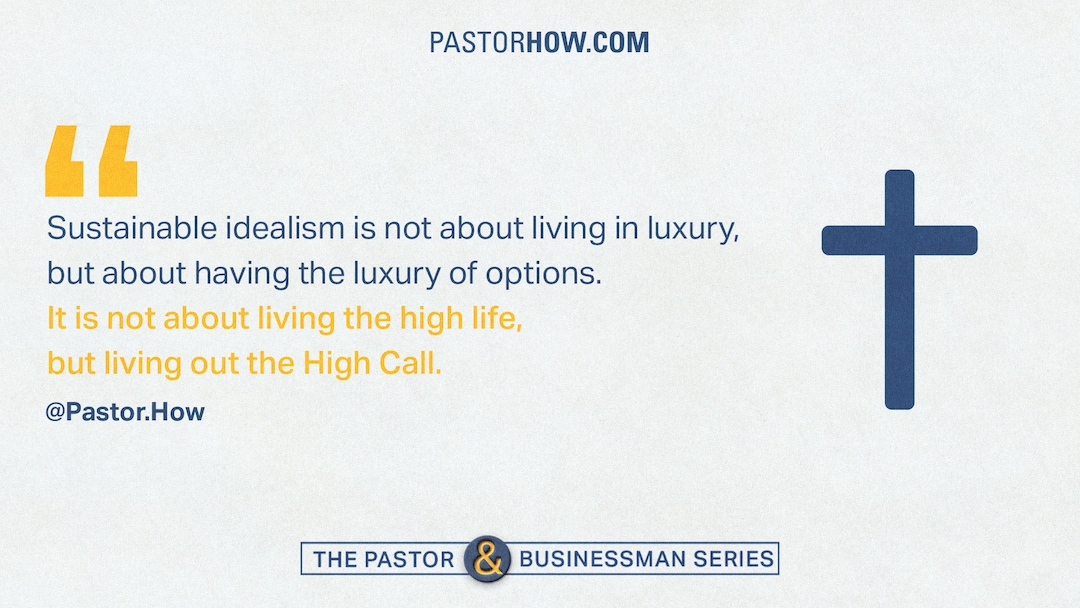
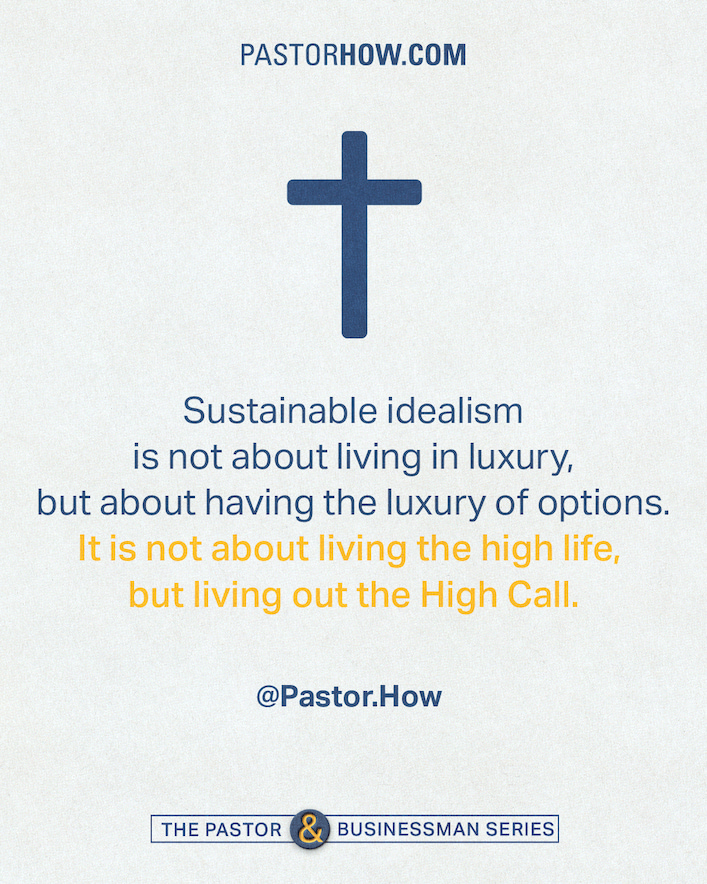
One of the things I observed over the years is that many of my peers who were idealistic and on-fire for God when they were youths and young adults did not carry the same passion for God into their 30s and 40s. The reality of financial obligations and the cost of raising children snuffed out their dreams for God. Some even turned bitter against God because they felt that they had given God their youth and were now “lagging behind” others who had served God at a lesser capacity.
As a pastor of a youth church, this concerned me. Pastor Lia and I believe that a successful youth church can only be determined ten to twenty years later when these youths have grown up. Would they still carry the same character and spiritual convictions as husbands, wives, parents and in the marketplace? We want the youth in our church to be loving Jesus and serving God for the long haul. We want their idealism to be sustainable.
Sustainable idealism works in different forms and many ways. Two big areas are time and money.
For those in the marketplace, Sustainable Idealism works best if you are in a vocation with autonomy and flexible hours. That is why we encourage entrepreneurship in our church.
Take our Missions Director, Martin, and our Head of Children’s Church (HeartKidz), Mae-Ann, for example. Because this couple are entrepreneurs, Martin is able to fly out on mission trips frequently, while Mae-Ann leads our entire Children’s ministry of over 220 kids and nearly 100 volunteers. Both of them are also pastoral leaders. They lead two zones of 200 people. They are volunteers. So the two main reasons they can serve at such high capacity are because they control their time and have financial freedom.
Our staff work extremely hard. In accordance with conventional HR policy, they complete 45 hours of work a week. (In reality, most of them probably work 60+ hours because they simply love what they do. I sometimes have to chase them home!). But after fulfilling their required hours, they are given the freedom to take up one other vocation. Some of our church staff are creative freelancers and real estate agents, to name a few. Others work for their family business. One of the benefits is of course financial. They have the option to earn additional income on top of being paid competitively by the church. As almost all our staff are young and do not have children yet, this arrangement is not only viable, but the professional exposure from working outside also makes them more relevant to their ministries.
There are also several HOGC staff who work half the time in my business and the other half in church. This was necessary especially in the earlier days when church was smaller. We have this arrangement because church could not afford to pay them solely for a specific skill they brought to the table, e.g., sound engineering, IT, etc. The business comes in to supplement their income while giving them flexibility to continue serving God at a high capacity. Since I am both their pastor and their boss, they don’t have to apply for leave from business to organize or attend church events.
We always teach in church that God must be our number one priority. My business is a case study that shows how to practice what we preach.
Being in ministry and business is not only possible, it is biblical. If you think God has given you this dual calling, then enter the business world with optimism guided by the fear of God, while navigating the church world with faith escorted by wisdom. Always guard your heart and motivations. Obey God and ask Him for wisdom. Then take the best of each world so that God will be even more glorified through both your ministry and your business.

Receive leadership principles for building a Strong Church
I absolutely love this entire Pastor & Businessman series!!! I had been a financial services consultant for a couple of years before having the privilege to come on as a full time staff in HOGC. But even as I started full time in church, I was still given the flexibility to retain my other vocation. It is really out of Pastor How & Pastor Lia’s heart to give the staff sustainable idealism—the ability to serve God and help others, while being paid competitively.
As I am becoming a parent in the next two months, I couldn’t be more thankful that Pastor How and Pastor Lia aren’t just our bosses but our spiritual parents. They truly think and provide for us staff as family members. With my husband also being a full timer in church but having the privilege to work in Pastor’s business, we never had to worry about our finances or starting a family and we can continue to serve God full time.
Thank you Pastors for laying down and living out these principles you talked about. Truly, it is our greatest privilege to be part of this team!!!
Being a staff in Pastor How’s business over the years has given me the opportunity to witness firsthand just how generous my bosses and Pastors are. $400k worth of products to bless people is no small sum, and it speaks volumes of their desire to use their business as a tool to further the kingdom of God – not the other way round. Simply grateful to be able to have this perspective of what having a business should be about – not just profit for selfish gain, but provision for others around you too. Thank you Pastor How for this interview and this series!
Dear Pastor How, thank you for laying out your principles and thoughts so concisely and clearly. This is so helpful in helping Christian Leaders like myself to understand how to properly navigate working (or being a business entrepreneur) in the world while still giving our best to serve and love God. This sharing has taught me important guiding principles and considerations. I love the part about sustainable idealism – those who serve God full-time and at a high level of commitment are able to still take on an additional vocation and have both laity and clergy; and those working in the world can have the luxury of option to still have time and capacity to serve God. I am so inspired to do the same as you and Pastor Lia after reading this Q&A and also the article earlier. Most importantly, I have also learnt the importance of exercising wisdom, because as much as we can be internally water-tight with biblical guiding principles, we must also remember that we cannot control the external opinions. Thank you for sharing and setting the exemplary benchmark!
Thank you Pastor How for planning out this whole series to align and equip us.
One year ago, I was a fresh graduate and had thoughts about acquiring a business but with negligible know-hows. Pastor, I vividly remember one of ministry duties where you took time to find out what I was doing in life and personally encouraged me… This is unheard of in the world because valuation and affirmation only comes with real experience and abilities.
Your words like “love the entrepreneurial spirit”, “believe in you”, “dream big”, “you have a great future” literally planted courage in me. Since then, I’ve been encountering God in my business and it has enabled me to give more in my finances and flexibility of time to serve God .
Furthermore, there are just so many practical principles and non-negotiables that I’ve caught. For example, I was inspired by how Pastors would say HOGC should not be at its pinnacle in their time and it should never be hinged on their charisma.
Having learnt this, I withheld myself from trying to micro-manage everything as a business owner but delegated duties to my employees and challenged them to break out of their comfort zone. Along the way, I would highlight what was good, value their inputs and suggest what they could grow in. All of which was what I’ve learnt in church! Just by applying these principles, it built character and heart in my business, people could feel the difference.
Dear Ps How,
This is really such an insightful interview. Thank you for sharing.
This is really the reason why Mae-Ann and I went into business. Our motivation is first to build the church and to serve God. I am so glad that Pst How teaches about Sustainable Idealism so that now, we can really be involved in serving and building the church at a higher capacity.
In the same way, we also use the business to build the church. Today, we can have the flexibility of time to serve while at the same time also have the financial independence to live a life without lack.
Our business exists to serve and to build God’s house and His people. Our greatest privilege is not to run a business. But our greatest privilege is to run a business that is able to build God’s house and His people.
Thank you, Pst, for first modeling and showing us the way to do this. Without you, Mae-Ann and I would never dream nor even have the right motivation to do business.
Dear Pastor How,
I have seen how you lead the church and run the business with godly values. This is what inspired my husband and I to manage our tuition business in the same manner.
For a tuition business, weekends are the best time to earn money. However we saw how you always put God first in the decisions you made. Hence we gave our Christian staff time to serve in their churches and not max out their classes on a weekend. Instead of the business suffering, it actually grew.
Thank you for building us and sharing with us so generously your principles and wisdoms over the years.